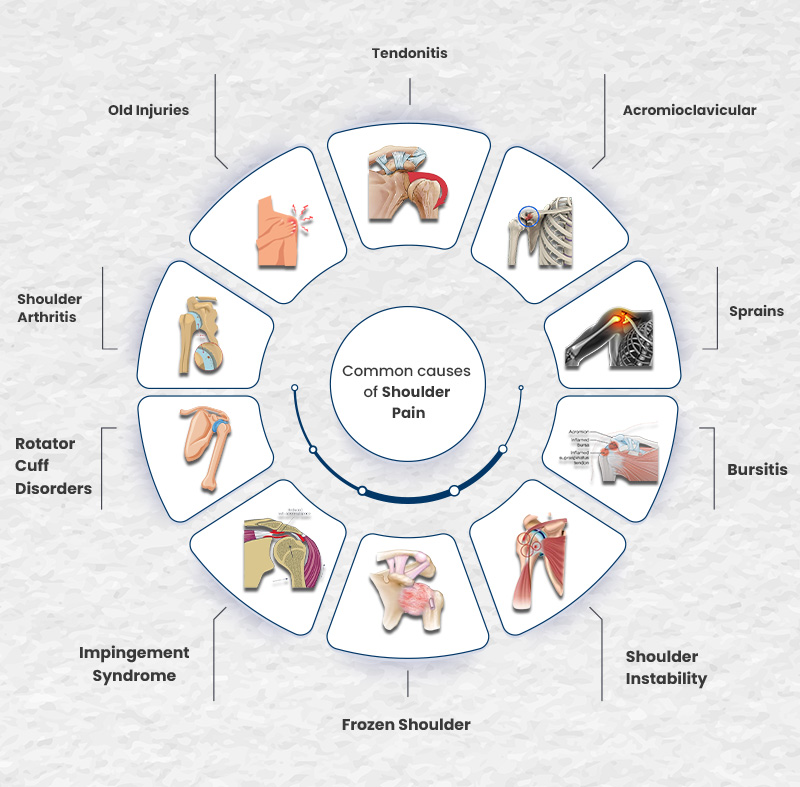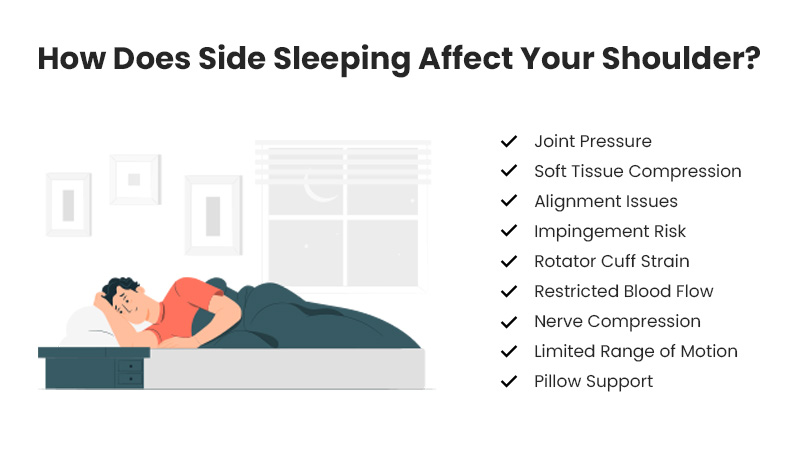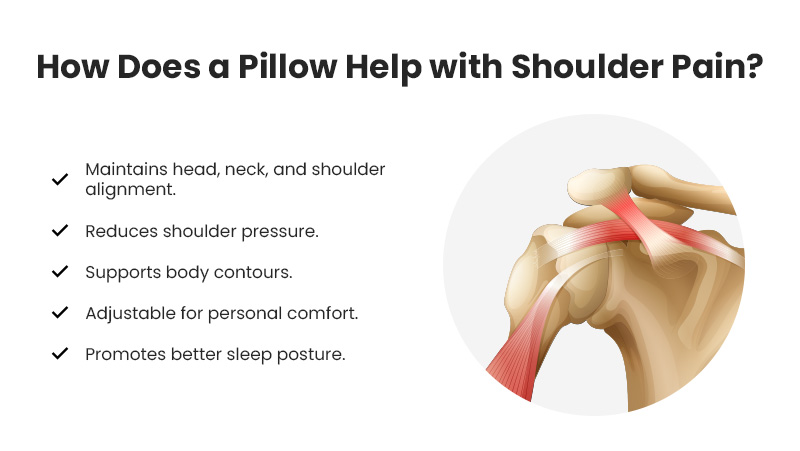According to studies, 18% to 26% of people report shoulder pain at some point, which covers sudden and persistent shoulder discomfort. Shoulder pain can get in the way of living your most comfortable life—and unfortunately, it doesn’t just magically go away after the sun has gone down. Many people find their shoulders aching, specifically at night.
This makes it hard to fall asleep, get a good night’s rest, and feel fresh and energized the following day. So, why does this happen? What can we do about it? What can we take? What do we need to know?
We will discuss everything from why your shoulder may hurt during sleep to what measures you might take to prevent shoulder pain. We’ll also look into some treatment options that will help you sleep well without experiencing any pain whatsoever!
What Causes Shoulder Pain While Sleeping?

Do you wake up daily with aching shoulders and just can’t seem to get a good night's sleep? Getting rid of neck, shoulder, and back pain is not easy. If this sounds familiar, then know that you’re not alone. Many people have trouble with shoulder pain at night while they sleep. Multiple factors might be contributing to your shoulder pain, and the important thing is to figure out what’s causing your problem so you can treat it properly!
Bursitis
One of the leading causes of shoulder pain when asleep is shoulder bursitis. Bursitis is the inflammation of a bursa, a small fluid-filled sac that works as a pillow between bones and tendons at the joints. If this sac gets swollen, it may cause pain, rigidity, and discomfort in your shoulders, especially at night while sleeping. Bursitis can result from overuse, injury, or other underlying conditions like osteoarthritis.
Symptoms
- Pain in the affected area (shoulder, elbow, hip, knee)
- Swelling and tenderness around the joint
- Limited range of motion
- Warmth and redness over the affected area
- Pain worsens with movement or pressure
Treatment
- Rest and avoid aggravating activities.
- Apply ice packs for 15-20 minutes multiple times daily.
- Use NSAIDs (e.g., ibuprofen, aspirin) for pain and inflammation.
- Perform strengthening and flexibility exercises.
- Consider corticosteroid injections for inflammation and pain relief.
- Surgery for bursa removal is a last resort.
- Modify activities to avoid exacerbating symptoms.
Osteoarthritis
Osteoarthritis is another leading cause of shoulder pain during sleep. It is a degenerative joint disease in which protective cartilage within your joints wears away over time. This problem can cause the joint to hurt, become stiff, and have limited motion, making it hard to find a comfortable position for sleeping.
Symptoms
- Joint pain during or after movement
- Stiffness, especially in the morning or after resting
- Swelling around the affected joint
- Limited range of motion
- Bone spurs (extra bits of bone around the affected joint)
Treatment
- NSAIDs for pain and inflammation.
- Exercises to strengthen and increase joint flexibility.
- Maintain a healthy weight to reduce joint stress.
- Use braces or assistive devices.
- Corticosteroids or hyaluronic acid for pain relief.
- Joint replacement if necessary.
- Modify activities to protect joints.
Frozen Shoulder
A painful shoulder that locks up and stops moving for a long time is known as a frozen shoulder (adhesive capsulitis). Generally, a person will experience light pain that becomes worse over hours, resulting in severe stiffness. Many people with adhesive capsulitis find it hard to sleep on their affected side due to radiating pain.
Symptoms
- Gradual onset of shoulder pain and stiffness
- Difficulty moving the shoulder, especially lifting the arm
- Pain worsens at night or with movement
- Limited range of motion in the shoulder joint
Treatment
- NSAID for pain and inflammation.
- Gentle stretching and range of motion exercises
- Apply hot or cold packs to the shoulder
- Injecting sterile fluid into the shoulder joint (Hydrodilatation) to stretch and expand the capsule.
- Manipulation under anesthesia or shoulder arthroscopy to release tight tissues and improve range of motion.
- Perform prescribed exercises regularly to maintain shoulder mobility
Rotator Cuff Injury
A rotator cuff injury can cause intense discomfort in the shoulders while sleeping, mainly if the patient is an athlete or engages in repetitive overhead motions. The rotator cuff comprises muscles and tendons surrounding the joints of the arms. Damage may be felt in the form of weakness, limited mobility, or even total absence of comfort while trying to find a good sleeping position.
Symptoms
- Pain when lifting or lowering the arm
- Difficulty or weakness when lifting or rotating the arm
- Pain that radiates from the front of the shoulder to the side of the arm
- Pain at night, especially when lying on the affected shoulder
Treatment
- Avoid activities that worsen symptoms.
- Apply ice packs for 15-20 minutes several times a day.
- NSAIDs (e.g., ibuprofen, aspirin) for pain and inflammation.
- Strengthening and stretching exercises
- Reduce inflammation and pain with Corticosteroid Injections
- Repair torn tendons in severe cases surgically
- Modify activities to prevent further injury to the rotator cuff.
Impingement Syndrome
The squeezing and annoying of the tendons and bursa between bones is known as shoulder impingement syndrome. It can be caused by various factors, such as repetitive overhead movements, injury, or underlying conditions like osteoarthritis. Pain, rigidity, and discomfort in the shoulder, which makes it hard to sleep on the affected side, are some of its main symptoms.
Symptoms
- Shoulder pain that worsens with overhead activities or reaching behind the back
- Pain and tenderness on the front and side of the shoulder
- Weakness and difficulty in lifting the arm
- Painful clicking or popping sensations in the shoulder
Treatment
- Avoid activities that aggravate symptoms
- Apply ice packs for 15-20 minutes several times a day
- NSAIDs (e.g., ibuprofen, aspirin) for pain and inflammation
- Strengthening and stretching exercises to improve shoulder mechanics
- Corticosteroid Injections to reduce inflammation
- Arthroscopic surgery to remove inflamed tissue or bone spurs
- Adjust posture and activities to minimize shoulder strain
Tendonitis
Tendonitis is an inflammation of tendons (thick cords linking muscle with bone). Overuse, injury, and aging can lead to tendonitis, causing pain or discomfort at any part, mainly around the shoulders. Individuals suffering from this condition may feel more pain during sleep because they don’t move their arms, hence tightening them.
Symptoms
- Pain and tenderness around the affected tendon
- Swelling and warmth near the tendon
- Pain that worsens with movement of the affected joint
- Limited range of motion and stiffness
Treatment
- Avoid activities that strain the affected tendon.
- Apply ice packs daily for 15-20 minutes to reduce swelling and pain.
- NSAIDs to alleviate pain and inflammation.
- Exercises to stretch and strengthen the affected tendon and surrounding muscles.
- Corticosteroid Injections provide targeted relief by reducing inflammation in the tendon.
- Splinting or Bracing to immobilize the affected joint and allow it to heal.
- Gradually reintroduce activities and movements to prevent recurrence.
How Does Sleeping on Your Side Cause Shoulder pain?
Sleeping on your side might hurt your shoulders because it places pressure on them, compressing the shoulder joint. Your shoulder carries most of the weight when you are lying down this way, especially for those who sleep on their sides while hugging a pillow. The continuous compression and force can bring about inflammation and strain within muscles around or inside of it.
Another cause of arm pain when sleeping sideways could be how you position your arms; if one places his/her arm beneath the head or under a pillow during sleep, discomfort may arise due to the unnatural angles at which the body part needs to stay fixed all night long, subsequently leading to painful sensations.
The more one sleeps on their identical side each night, the more uneven their shoulders may become, making one side more susceptible to pain.
Another group of people who may feel discomfort during shoulder sleeping is those with current shoulder injuries, such as bursitis, rotator cuff tears, or arthritis. These individuals already have damaged areas, which can be worsened by added strain caused by lying in such positions too long.

Tips to Avoid Shoulder Pain for Side Sleepers
- You should employ a side sleeper pillow for shoulder pain to prevent the neck and head from bending at the wrong angle. To keep your torso appropriately aligned with the rest of the body while in this position, as well as have something between your legs that will help take pressure off the lower back area during sleep for side sleepers
- If one shoulder is aching, do not lie on it; instead, sleep on the other side. A firmer mattress may also be needed in such cases.
- Move around until it feels right; lying down should be pain-free. A full body pillow can help align hips and shoulders so that all three parts’ weight is evenly distributed across the bed while sleeping, thus preventing any one area from becoming tender or sore due to too much pressure being exerted on it constantly without relief throughout the night.
- Ensure the bed offers adequate support without aggravating conditions like bursitis and tendonitis.
- Apply warm packs over affected regions; compress for approximately fifteen minutes each time they’re heated up again. These actions would reduce inflammation and relax tight muscles.
- Consult your physician and take the prescribed painkillers.
What is the Best Pillow for Shoulder Pain?
Consider a few things when finding the best pillow for shoulder pain. Shoulder pain pillows are specifically designed to offer the most comfort and support. They are meant to provide targeted back support and relieve any discomfort that you might feel in your arms.
Try to go with brands specializing in neck and shoulder pain and get the best neck pillow. These pillows tend to be shaped to support the neck while also cradling it, promoting proper posture alignment and reducing tension.
Generally, a material like memory foam or latex makes good shoulder pain pillows because they conform to natural body curves, thus relieving pressure points. Additionally, these types of pillows should be able to adjust their firmness levels to provide different heights for each individual’s liking throughout the night while still keeping the shoulders well supported.
A cervical neck pillow can support your cervical spine more, as it helps you maintain a neutral alignment, indirectly supporting the health of your shoulder.
Supportive contouring that molds to the shape of your neck and shoulders and adjustability in loft or firmness for different sleeping positions are essential aspects to consider. Memory foam pillows offer excellent contouring, while latex pillows are responsive and hypoallergenic.
Furthermore, cooling pillows with unique properties, such as gel-infused memory foam or breathable covers, may improve comfort, especially for individuals who sweat a lot when sleeping, also known as “hot sleepers.”

When to Seek a Medical Professional?
Knowing when to seek medical help for shoulder pain is critical to diagnosing and treating it early. If you have ongoing or severe shoulder pain that does not get better with rest or over-the-counter painkillers, you should see a doctor.
Furthermore, if your shoulder hurts and is swollen, red, or warm to the touch around the joint, this may indicate something more serious, such as recent trauma/injury, needing urgent attention. Another thing is when there’s numbness/tingling down arms from shoulders along with weakness felt within them—these could also mean there’s been some nerve damage done here, so don’t hesitate to get checked out ASAP.
Additionally, any abrupt loss in movement abilities should send warning bells because it might signify an infection, especially if accompanied by fever!
If you have ever had shoulder problems historically or are dealing with conditions that cause shoulder pain, or if the pain is interfering a lot with your day-to-day activities or affecting your general quality of life, then you need to see a doctor who specializes in health problems so that they can diagnose your shoulder problem well and find the best way to deal with it.





















